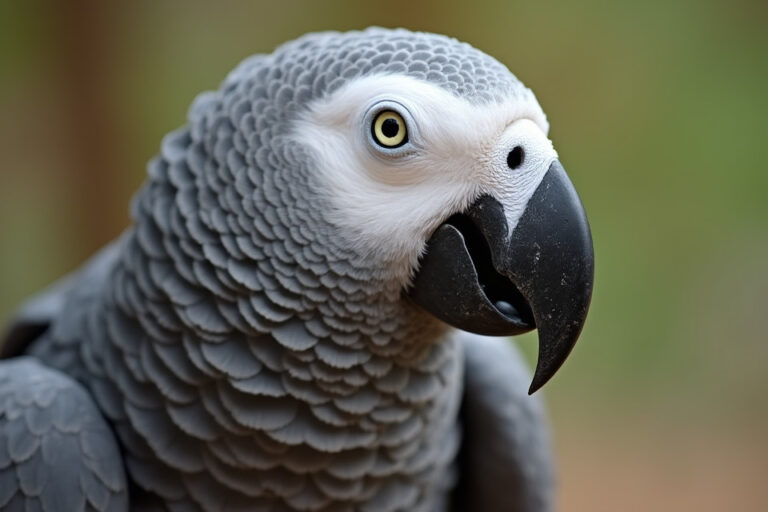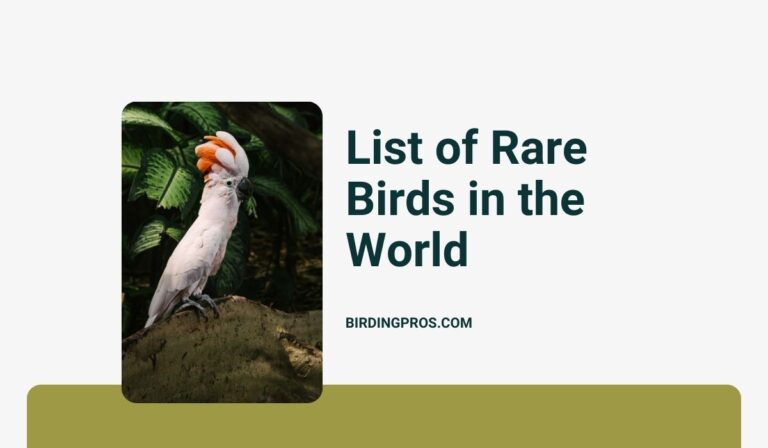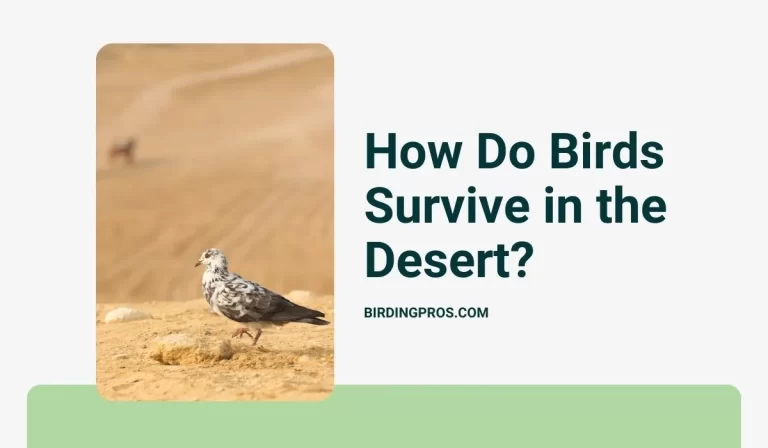Can Lovebirds Eat Cherries? Detail Guidelines
As a pet owner, you want to provide the best for your feathered friends, and part of that involves feeding them a balanced and nutritious diet.
You may be wondering, “Can lovebirds eat cherries?” This question is crucial because lovebirds, like many other pet birds, have specific dietary needs and restrictions.
In this article, we will explore whether cherries are safe for lovebirds, the benefits and risks involved, and how to incorporate cherries into their diet safely.
Table of Contents
The Dietary Needs of Lovebirds
Before diving into whether lovebirds can eat cherries, let’s first understand their dietary needs. Lovebirds primarily consume seeds, fruits, vegetables, and occasionally, small insects in the wild.
A balanced diet for a pet lovebird includes a mix of seeds, pellets, fresh fruits, and vegetables to ensure they get the necessary vitamins, minerals, and nutrients.
What Should a Lovebird’s Diet Consist Of?
A typical lovebird diet should include:
- Seeds and Pellets: These should form the base of their diet. Pellets are specifically formulated to meet the nutritional needs of birds, and seeds provide essential fats and proteins.
- Fresh Fruits and Vegetables: Offer a variety of fruits and vegetables daily. This adds essential vitamins and minerals to their diet.
- Grains and Legumes: Cooked grains and legumes are excellent for lovebirds as they provide protein and fiber.
- Water: Fresh water should always be available.
Can Lovebirds Eat Cherries?
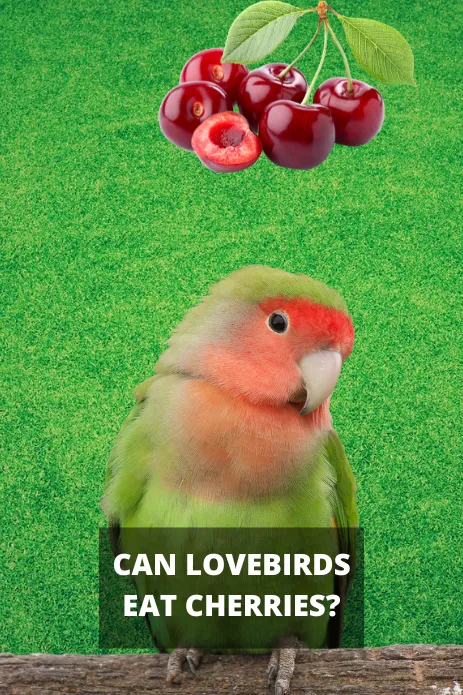
Now, to the main question: Can lovebirds eat cherries? The short answer is yes, but with some important precautions. Cherries, like many fruits, can be a tasty and nutritious treat for lovebirds when given in moderation.
Feeding Lovebirds Cherries: Nutritional Benefits of Cherries
| Benefits | Why? |
| Vitamins | Cherries are rich in vitamins A and C. Vitamin A is vital for maintaining healthy vision and a robust immune system, while vitamin C acts as an antioxidant and supports overall health. |
| Minerals | They contain essential minerals such as potassium and magnesium, which are important for muscle function and overall cellular health. |
| Fiber | Cherries are a good source of dietary fiber, which aids in digestion and helps maintain a healthy weight. |
Potential Risks of Feeding Cherries to Lovebirds
While cherries can be a healthy treat, there are some potential risks to consider:
- Cherry Pits: The most significant risk when feeding cherries to lovebirds is the pit. Cherry pits contain cyanogenic compounds, which can release cyanide when chewed or crushed. Cyanide is toxic to birds and can be deadly if ingested. Always remove the pits before offering cherries to your lovebird.
- High Sugar Content: Cherries are high in natural sugars, which can lead to weight gain and other health problems if consumed in excess. It’s crucial to feed cherries in moderation and as part of a balanced diet.
- Pesticides and Chemicals: Many commercially grown cherries are treated with pesticides and chemicals that can be harmful to birds. Always wash cherries thoroughly before feeding them to your lovebird, or opt for organic cherries to minimize this risk.
Expert Opinions on Feeding Cherries to Lovebirds
Many avian veterinarians and bird experts agree that while cherries can be part of a lovebird’s diet, they should be given sparingly and with caution.
According to Dr. Laurie Hess, a board-certified avian veterinarian, “Fruits like cherries can be a healthy addition to a bird’s diet, but it’s essential to avoid the pits and ensure that any fruit offered is free from pesticides and chemicals.”
This insight emphasizes the importance of feeding fruits responsibly and in moderation.
Read More: Pet Bird Food Guide: Pros and Cons
How to Safely Feed Cherries to Lovebirds
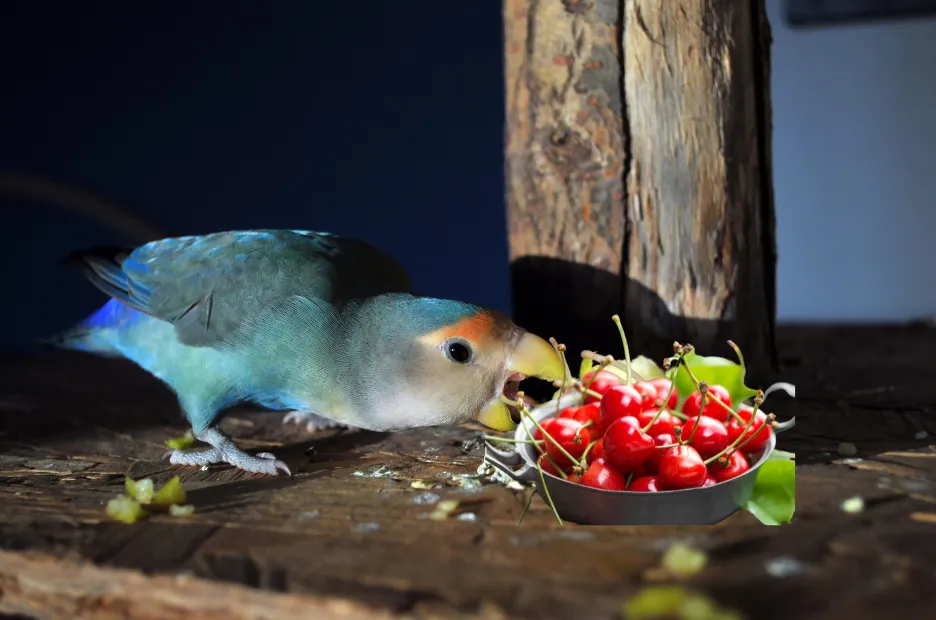
If you decide to introduce cherries to your lovebird’s diet, here are some steps to ensure they are given safely:
Preparing Cherries for Your Lovebird
- Remove the Pit: The pit is the most dangerous part of the cherry for birds. Always remove it completely before offering the fruit to your lovebird.
- Wash Thoroughly: Rinse the cherries thoroughly under running water to remove any pesticides or chemicals.
- Cut into Small Pieces: Cut the cherry into small, manageable pieces to prevent choking and make it easier for your lovebird to eat.
- Offer in Moderation: Start by offering a small piece to see how your lovebird reacts. Monitor their behavior and droppings to ensure they are digesting the fruit well.
Alternative Fruits Safe for Lovebirds
If you are unsure about feeding cherries to your lovebird or want to provide a variety of fruits, there are many other safe options:
- Apples (without seeds): Apples are a great source of fiber and vitamin C. Just be sure to remove the seeds, as they contain cyanogenic compounds similar to cherry pits.
- Berries: Blueberries, strawberries, and raspberries are rich in antioxidants and can be safely given to lovebirds.
- Pears (without seeds): Pears are high in fiber and water content, making them a hydrating snack for birds.
- Mango: Mangoes are high in vitamins A and C and are loved by many birds.
Personal Experiences with Feeding Cherries to Lovebirds
I remember the first time I offered cherries to my lovebird, Kiwi. I was nervous because I knew the potential risks involved.
I meticulously removed the pit, washed the cherry, and cut it into small pieces. To my surprise, Kiwi loved it! He chirped happily and seemed to relish the juicy treat.
However, I made sure to offer cherries sparingly, mixing them with other fruits to maintain a balanced diet.
Balancing Treats and Regular Diet
Feeding treats like cherries is all about balance. While it’s exciting to see your lovebird enjoy new foods, it’s important not to overdo it.
Just like us, birds can develop a preference for sweeter treats, which might lead to them ignoring their staple diet of seeds and pellets.
Keep treats like cherries as an occasional delight rather than a daily staple.
Addressing Counterarguments: The Case Against Cherries
Some bird owners and experts argue against feeding cherries to lovebirds altogether due to the risks involved.
They suggest sticking to fruits with lower sugar content and no toxic parts, like berries or melon.
The argument is based on the principle of minimizing any potential risks, especially if you are a new bird owner and unsure about proper preparation.
Acknowledging the Concerns
These concerns are valid, and it’s essential to weigh the benefits and risks when deciding what to feed your lovebird.
If you are concerned about the risks associated with cherries, consider consulting an avian veterinarian who can provide guidance based on your bird’s specific health needs and dietary requirements.
Conclusion: Should You Feed Cherries to Your Lovebird?
So, can lovebirds eat cherries? Yes, they can, but with precautions. Cherries can be a healthy and delicious treat for your lovebird when offered in moderation and with the pit removed.
If you have any doubts or concerns, don’t hesitate to consult with an avian veterinarian.
Feeding your lovebird involves more than just providing food—it’s about ensuring their overall health and happiness.
Incorporating cherries into your lovebird’s diet can be a rewarding experience that adds variety and nutrition to their meals.
Just be mindful of the potential risks and prepare the cherries properly to ensure your feathered friend stays healthy and happy.

